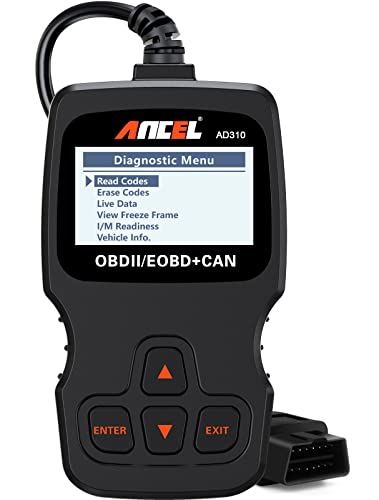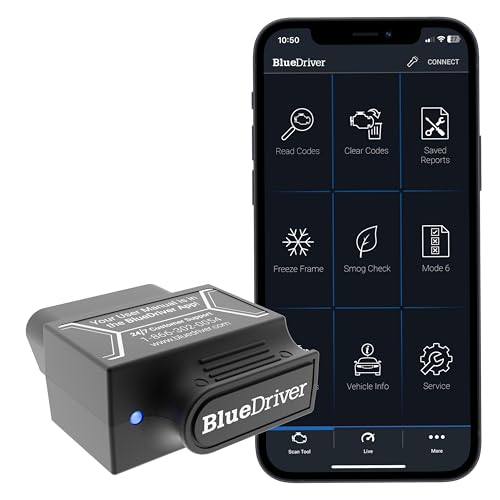There was a time when a persistent “Check Engine” light or an unexplained dashboard warning filled me with dread, immediately sending me to a mechanic and bracing for a hefty bill. Dealing with intermittent issues or simply understanding what my car was trying to tell me felt like navigating a foreign language. That frustration of not knowing the root cause of a problem, or having to pay just to diagnose a minor glitch, was a constant pain point. Had I possessed a reliable Autel AutoLink AL619 OBD2 Scanner back then, it would have saved me significant time, money, and anxiety, preventing minor issues from escalating into costly repairs.
- 【Accurate ABS/SRS Diagnostics Functions】The ABS/SRS diagnostic function is used to retrieve and clear codes from the vehicle’s ABS/SRS systems. It also provides the definition of each code to...
- 【All 10 Modes of OBD II Diagnostics Function】The OBD II Diagnostics function is a fast-access option that allows you to carry out a quick test on the engine system of OBD II vehicles. Read Codes,...
Essential Considerations Before Investing in an Automotive Diagnostic Tool
For anyone who owns a vehicle, the occasional dashboard warning light is an inevitable reality. An automotive diagnostic tool like an OBD2 scanner serves to bridge the communication gap between you and your car’s complex computer systems, deciphering cryptic error codes and pinpointing potential issues. This can range from a simple loose gas cap triggering a “Check Engine” light to more serious malfunctions affecting the anti-lock braking system (ABS) or supplemental restraint system (SRS). An ideal customer for such a device is the proactive car owner who wants to understand their vehicle’s health, perform basic diagnostics, or verify a mechanic’s assessment before committing to repairs. DIY enthusiasts, those looking to save on diagnostic fees, or individuals buying used cars who want to check for hidden issues will find immense value. However, this category of tool might not be for everyone. If you have absolutely no interest in understanding how your car works, prefer to defer all maintenance to a professional, or primarily drive very new vehicles still under comprehensive warranty, a simpler, less feature-rich code reader might suffice, or perhaps no tool at all. Before purchasing, consider your vehicle’s make and model year (especially for ABS/SRS), the specific systems you want to diagnose, the update policy, and ease of use.
- CEL Doctor: The ANCEL AD310 is one of the best-selling OBD II scanners on the market and is recommended by Scotty Kilmer, a YouTuber and auto mechanic. It can easily determine the cause of the check...
- Multi-Functions - Practical Multi-Functions OBD2 code reader features built-in OBD2 DTC lookup library, which help you to determine the cause of the engine light, read code, erase code, view freeze...
- [Pro OBD2 Scanner] - BlueDriver is the easiest way to scan and understand your vehicle like a professional mechanic. Read and clear your car’s trouble codes and check engine light.
Unveiling the Autel AutoLink AL619: A Closer Look
The Autel AutoLink AL619 OBD2 Scanner presents itself as a versatile and “2025 Newer” diagnostic code reader, designed to empower car owners with professional-grade diagnostic capabilities. It promises to retrieve and clear codes from your vehicle’s crucial ABS and SRS systems, alongside offering all 10 modes of standard OBDII diagnostics. When you purchase this diagnostic tool, it typically comes with the scanner unit itself, a USB cable for updates and data printing, and a user manual. Compared to simpler OBDII readers, the AL619 elevates its game by including ABS and SRS diagnostics, a feature often found in more expensive, tablet-based professional tools. It’s positioned as an updated version of models like the MS319, AL519, ML519, and ML619, suggesting enhanced capabilities. This specific product is ideal for the serious home mechanic or a small garage owner looking for a robust, dedicated device that goes beyond basic engine codes. It’s less suited for someone who only needs to check basic engine codes occasionally or for professional shops needing extensive bidirectional control and programming features.
Pros:
* Comprehensive ABS/SRS Diagnostics: Goes beyond basic OBDII, offering critical insights into safety systems.
* Full 10 Modes of OBDII: Covers all essential engine diagnostics, including Live Data and Freeze Frame.
* Wide Vehicle Coverage: Supports a vast array of US, Asian, and European vehicles from 1996 onwards.
* User-Friendly Interface: Relatively intuitive operation with clear menu navigation.
* DTC Lookup Feature: Built-in definitions save time searching for code meanings.
Cons:
* Outdated Software Coverage: Despite being advertised as “2025 Newer,” user reports indicate updates stopped around 2018, leading to compatibility issues with newer vehicles.
* Inconsistent ABS/SRS Performance: Some users experience issues with specific vehicle models or functions not working as advertised.
* Misleading “Lifetime Updates” Claim: The lack of recent updates contradicts the promise of free lifetime software updates.
* Language Support Issues: Reports of missing French menus or translated manuals despite claims.
* Quality Control Concerns: Some users received units that appeared to be used or had minor cosmetic damage.
Delving Into the Core Capabilities and Advantages
Advanced ABS/SRS Diagnostic Functions
One of the standout features that truly distinguishes the Autel AutoLink AL619 OBD2 Scanner from many entry-level code readers is its ability to delve into the Anti-lock Braking System (ABS) and Supplemental Restraint System (SRS), commonly known as the airbag system. These are critical safety systems in any modern vehicle, and a warning light for either can indicate a potentially dangerous issue. When your ABS light illuminates, it could mean anything from a faulty wheel speed sensor to a problem with the ABS module itself, affecting your braking performance and safety. Similarly, an SRS light signals a potential issue with your airbags, seatbelt pretensioners, or associated sensors, which could compromise occupant safety in a collision.
With the AL619, you’re not just guessing. This feature allows you to retrieve specific diagnostic trouble codes (DTCs) from these systems. Not only does it pull the code, but it also provides a definition right on the screen, helping you understand the problem without needing to consult a separate manual or an online database. Once the issue is identified and resolved, the tool enables you to clear these codes, turning off the corresponding Malfunction Indicator Light (MIL). This capability is incredibly important because it allows for a more targeted diagnosis and repair. Without it, you’d be forced to take your car to a specialized shop for what could be a simple sensor replacement, incurring significant diagnostic fees. Having this in your arsenal means you can often diagnose and fix issues related to these complex safety systems, saving you time and money, and most importantly, ensuring your vehicle’s safety features are fully operational. However, it’s crucial to acknowledge the feedback from some users who found that despite the claims, the ABS/SRS functions did not work consistently across all advertised vehicles or model years, which can be a significant drawback.
Comprehensive 10 Modes of OBD II Diagnostics
Beyond the specialized ABS and SRS functions, the Autel AL619 provides all 10 modes of OBD II diagnostics, which are standard across all vehicles manufactured in 1996 and newer. This means it’s not just a fancy safety system scanner; it’s a complete engine diagnostic tool.
The primary modes include:
* Read Codes: This is the most fundamental function, allowing the scanner to pull current, pending, and permanent Diagnostic Trouble Codes (DTCs) from the engine control unit (ECU). These codes tell you exactly why your “Check Engine” light is on.
* Erase Codes: Once you’ve identified and fixed the problem, this function allows you to clear the stored DTCs and turn off the Check Engine Light. It’s crucial to only do this after a repair, otherwise, the light will simply reappear.
* Live Data: This is arguably one of the most powerful features. It allows you to view real-time parameters from various sensors in your engine, such as engine RPM, vehicle speed, oxygen sensor readings, coolant temperature, fuel system status, and much more. Monitoring live data can help diagnose intermittent problems that don’t always set a code, or confirm if a repair has been successful. For instance, if you suspect a faulty O2 sensor, watching its live output can quickly confirm its performance.
* Freeze Frame Data: When a fault code is set, the ECU records a “snapshot” of the engine’s operating conditions at that exact moment. Freeze Frame data includes parameters like engine speed, vehicle speed, fuel trim, and coolant temperature when the fault occurred. This information is invaluable for diagnosing issues that only happen under specific driving conditions.
* I/M Readiness Status: This indicates whether various emissions-related systems (like oxygen sensor monitors, catalytic converter monitors, etc.) have completed their self-tests. This is particularly useful for pre-checking your vehicle before an emissions inspection, ensuring it will pass.
* O2 Monitor Test: This mode allows you to retrieve and view the oxygen sensor monitoring test results from the vehicle’s computer. O2 sensors are crucial for fuel efficiency and emissions, so this helps assess their performance.
* On-Board Monitor Test: This function allows access to the results of on-board diagnostic monitoring tests for specific components/systems that are not continuously monitored. It helps identify intermittent failures or confirm the functionality of various systems.
* Component Test: This mode enables the scanner to control the operation of specific vehicle components (e.g., fuel pump, fan relays) to test their functionality. This can be immensely helpful for isolating faults to a specific part.
* Viewing Vehicle Information: You can retrieve the vehicle identification number (VIN), calibration ID (CALID), and calibration verification number (CVN) for your vehicle. This is useful for verifying car details or for some repair procedures.
* DTC Lookup: A built-in library of Diagnostic Trouble Code definitions means you don’t have to Google every code. The scanner provides a description right on the screen, streamlining the diagnostic process.
These 10 modes transform the AL619 from a simple code reader into a comprehensive diagnostic code reader, providing a holistic view of your engine’s health and helping you pinpoint problems efficiently. It’s the kind of comprehensive functionality that gives you peace of mind and the tools to make informed decisions about vehicle maintenance.
Wide Vehicle Coverage and Its Real-World Limitations
The product description proudly states that the Autel AutoLink AL619 supports more than 80 US, Asian, and European vehicle manufacturers, including popular brands like Acura, Audi, BMW, Ford, Honda, Hyundai, Mercedes-Benz, Nissan, Toyota, and Volvo, among many others. This extensive list suggests that for most car owners, this diagnostic tool should be compatible with their vehicle, offering widespread utility. The benefit of such broad coverage is clear: you don’t need multiple scanners for different car brands in your household or garage. It simplifies your toolkit and ensures you’re prepared for most diagnostic scenarios you might encounter with various vehicles. This inclusivity is a strong selling point, especially for those who work on diverse makes and models or have a multi-brand fleet.
However, this is where a significant discrepancy arises based on user experiences. While the scanner claims to work on “most 1996 and newer major vehicle models” and is advertised as a “2025 Newer” model, multiple users have reported that the device’s actual coverage for ABS/SRS diagnostics, and even some OBDII functions, is often limited to vehicles up to around 2016-2018. Some users have directly contacted Autel, only to be told that older, non-tablet-based units like the AL619 only receive updates for a limited period, and their support for newer models effectively ceases after a few years. This means that if you own a vehicle from 2019 or later, you might find that the promised ABS/SRS functionality, or even specific OBDII features, simply don’t work or recognize your car’s system correctly. This limitation significantly impacts the “wide vehicle coverage” claim, especially for those who purchase the device expecting compatibility with more recent models. It’s a critical point to consider, as the advertised broad compatibility might not hold true for newer vehicles, diminishing the overall value for some users.
Free Lifetime Updates & Print Data – A Closer Look at the Reality
The promise of “Free lifetime software update online” is a major attraction for any diagnostic tool. In theory, this means your Autel AutoLink AL619 OBD2 Scanner would remain current, adapting to new vehicle models, updated diagnostic protocols, and bug fixes for the entirety of its lifespan. Keeping diagnostic software updated is crucial because vehicle manufacturers constantly evolve their electronic systems, and an outdated scanner can quickly become obsolete, unable to communicate with newer cars or accurately interpret their codes. The benefit here is clear: perpetual relevance and continued investment protection.
Furthermore, the “Print Data” function allows you to connect the scanner to a PC or laptop via a supplied USB cable to print out diagnostic data or customized test reports. This is incredibly useful for documenting diagnostic findings, sharing information with mechanics or insurance companies, or keeping a detailed record of your vehicle’s health over time. For anyone meticulously tracking repairs or needing physical proof of a diagnostic reading, this feature adds a layer of professional utility.
However, this is another area where user feedback reveals a significant disconnect from the product’s marketing. Despite the “Free lifetime software update online” claim, many users have reported that the last available software update for this specific model was released around 2018. This directly contradicts the “2025 Newer” branding and the promise of ongoing updates. A product rep from Autel reportedly confirmed that only their tablet-based tools receive current coverage updates, implying that handheld units like the AL619 are effectively no longer supported with fresh software. This means that while the print function works, the underlying data might be limited by the scanner’s outdated database for newer vehicles. This cessation of updates is a substantial disadvantage, as it limits the device’s future-proofing and can lead to frustration when trying to diagnose later model vehicles. The benefit of “lifetime updates” essentially becomes nullified if the updates themselves cease after a few years, making the scanner less effective over time for an expanding range of newer vehicles.
What Other Users Are Saying: Community Feedback
Having browsed numerous online forums and product pages, it’s clear that experiences with this Autel AL619 are quite mixed. Many users appreciate its professional-grade feel and ability to pinpoint ABS and SRS issues, praising its value for money in identifying specific problem areas in their vehicles. However, a recurring concern is the discrepancy between the advertised “2025 Newer” status and the actual software support, with several owners noting that updates appear to have ceased years ago, limiting its compatibility with modern vehicles. Some were also disappointed by the lack of promised language options or received units that seemed previously opened. Despite these issues, those whose vehicles fall within its actively supported model years generally find it to be a capable and insightful diagnostic tool.
Final Thoughts and Recommendation
The persistent headache of mystery dashboard lights and the potential for expensive, unnecessary repairs is a problem every car owner dreads. Without a reliable diagnostic tool, these minor issues can quickly become major complications, leading to vehicle downtime and significant financial strain. The Autel AutoLink AL619 OBD2 Scanner offers a compelling solution by providing detailed ABS/SRS and comprehensive OBDII diagnostics. It stands out by giving you the power to understand your car’s health, troubleshoot issues, and make informed decisions about repairs. While it faces challenges with its update policy and compatibility with the very latest vehicles, for those with cars predominantly from 2018 or older, its robust feature set and user-friendly interface make it a worthwhile investment. If you’re ready to take control of your vehicle’s diagnostics and avoid unnecessary trips to the mechanic, Click here to explore the Autel AutoLink AL619 OBD2 Scanner and see if it’s the right fit for your automotive needs.
Last update on 2025-11-13 / Affiliate links / Images from Amazon Product Advertising API




